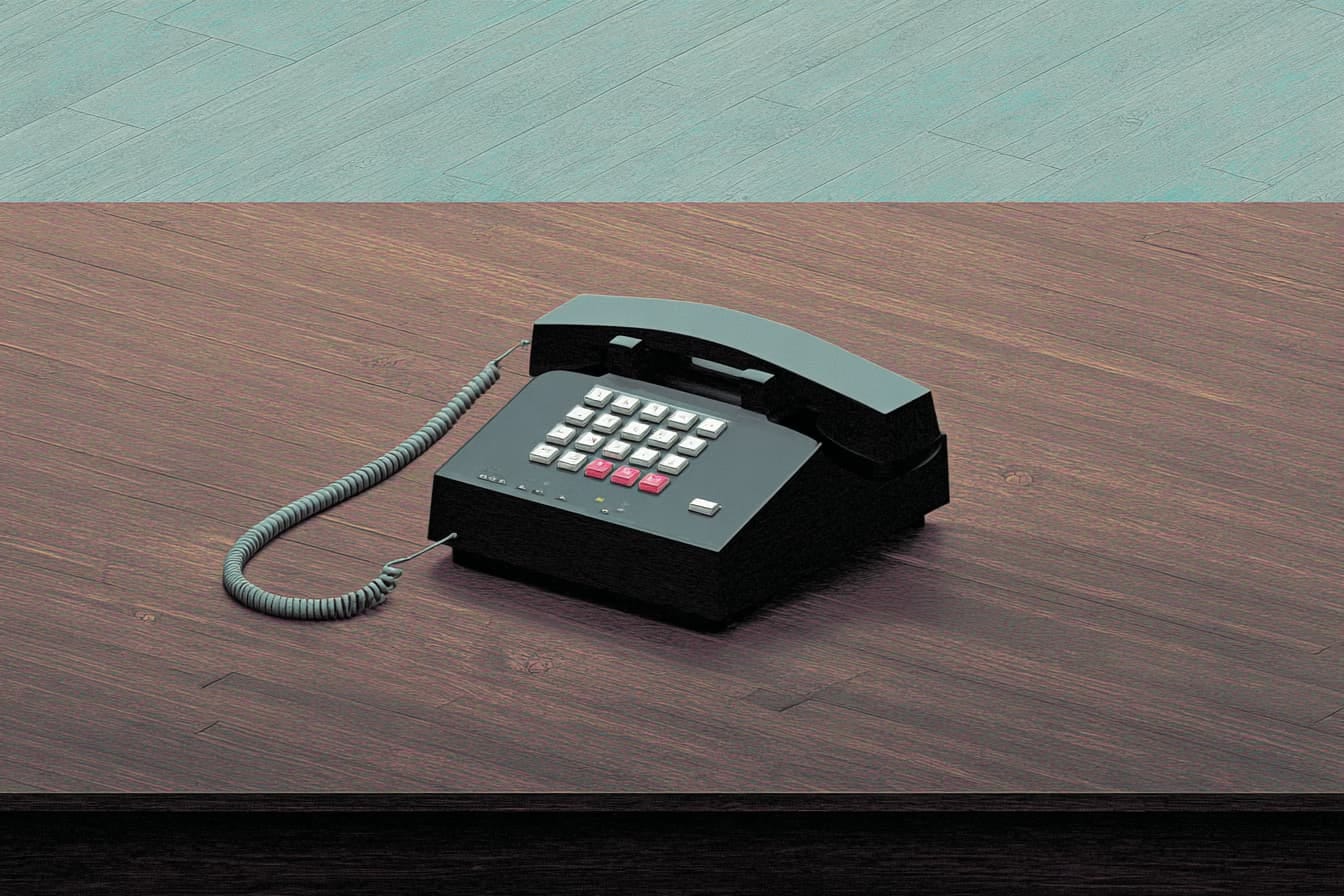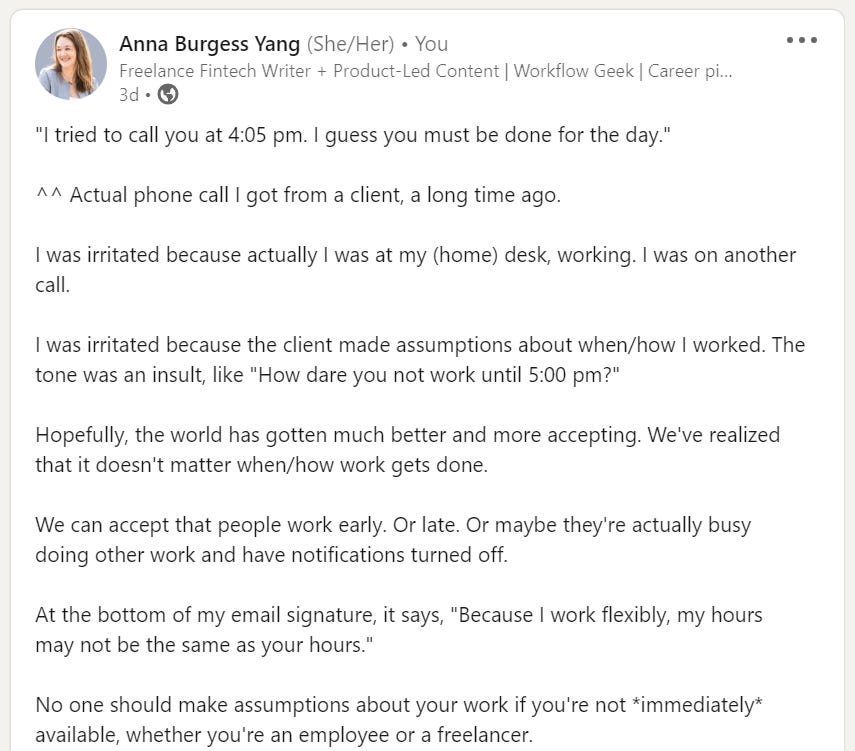I plan out this content's publication weeks in advance. Granted I usually write it the day before (or the morning of), but I know the topics, a general outline, related content, etc.
This week however I had to throw my plans out the window due to a LinkedIn post I wrote that went a little viral. It's currently sitting at more than 100k views and 700 reactions. And what's interesting is that a debate has emerged in the comments that wasn't the intent of the original post.
Here's what I wrote:
And the comments have morphed into a referendum on phones; specifically unscheduled calls. Yes, my post had to do with that but it was more about accepting workplace flexibility.
This is not the first time I've gone viral on The Internet (in fact, this publication was born from my first piece of viral content). When something gets that much attention, there will obviously be differing opinions. And since I've made it a goal to not pick fights with strangers online, I'm going to use the best tool at my disposal to provide counterarguments. This Substack.
Unscheduled calls pull our attention
I looked at my own call history this week. The only unscheduled calls were from my doctor’s office, my vet, and my spouse who likes to call me from his home office when walking down the stairs seems like too much effort.
I’m an Elder Millennial so I grew up with a landline. I didn’t have a cell phone until I was in college. I worked in customer service for many years, so I’m very used to unplanned phone calls. Even when a former company moved to a VoIP system, I still had a physical phone in my home office (albeit plugged in with an ethernet wire) and customers would call me directly.
Cell phones changed the dynamic: we became always available. With physical phones, if we weren’t at our desks, the calls would roll to voicemail (or, answering machines, as it were). We moved into a world of instant communication.
When an unplanned call comes in, it’s an interruption to the receiver — no matter what the circumstances. The receiver has to stop what they’re doing and answer the phone. Even if they ignore the call, it’s still an interruption. Or if the call goes directly to voicemail (thank you, Do Not Disturb), then the receiver has to return the call. Which interrupts the other person. Or results in a game of phone tag. Either way, it’s inefficient.
A woman on LinkedIn commented that she was utterly BAFFLED by the hate on phone calls. She wrote, “Personally, I love it when my clients actually pick up the phone and we get to have a conversation… I’m happy to stop whatever I’m doing.”
The woman also pointed out that sometimes calls are better than back-and-forth texts and emails. Problems can be solved faster.
I’m not disagreeing with that. I’m not saying calls are bad. I’m saying unplanned calls are bad. The woman even admitted that she’s happy to “stop whatever she’s doing.” That type of context-switching has a negative impact on work as a whole.
“Let’s chat when it’s convenient for me, not when it’s convenient for you.”
Many people in the comments agreed that asynchronous or scheduled communication is better for everyone. But one commenter said it was “difficult for him to wrap his head around” and that it was “borderline unprofessional” to imply that an unscheduled call is taboo — despite the fact that an overwhelming number of people were opposed to unscheduled calls.
This mentality was summed up by Toiloba Ayorinde: “They want you to work/chat when it’s convenient for them.”
Demands on someone else’s time is an exertion of power. We have all the tools and technology to swiftly enable scheduled phone calls (or asynchronous communication). If you’re still demanding a call, on your terms, then you’re trying to control the other person. Or you assume that you’re the most important thing about their workday.
I’m going to go out on a limb and guess that there’s a lot of overlap between people who think unscheduled phone calls are a good idea and people who think return-to-office is a good idea. It’s about controlling work.
The world is becoming asynchronous. And better about boundaries.
Erica Schneider wrote: “I can't see how setting boundaries is unprofessional. My time is valuable… To me, the expectation of immediacy is rude.”
We’re moving to an asynchronous world, but we’re not quite there yet. While my original story about someone who couldn’t get in touch with me at 4:05 pm was years ago, more recently I had someone who was irritated when I didn’t answer my phone. His voicemail said, “I guess you must be avoiding me.” Um, no. I had other work to do. It wasn’t a drop-everything-and-pick-up situation. Most phone calls aren’t.
Dear Ms. Baffled and Mr. Unprofessional: You may still like unscheduled phone calls. That’s fine. But you need to recognize that a huge chunk of the population views them as intrusive. An unnecessary interruption. A relic of past ways of working when hustle culture was all the rage. It’s not only about your preferences, but the preferences of the people around you. And the world of work is changing.
The best way to get in touch with me? Send a message and say, “When’s a good time for us to chat?” It’s more respectful of my time. And a better use of yours.
Most issues of this publication are free because I love sharing ideas and connecting with others about the future of work. If you want to support me as a writer, you can buy me a coffee.
If you love this newsletter and look forward to reading it every week, please consider forwarding it to a friend or becoming a subscriber.
Have a work story you’d like to share? Please reach out using this form. I can retell your story while protecting your identity, share a guest post, or conduct an interview.




